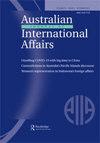人道主义观点:以人民及其健康为中心,而不是以国家安全为中心
IF 1.8
3区 社会学
Q2 INTERNATIONAL RELATIONS
引用次数: 1
摘要
摘要作为“联合国安理会与突发卫生事件”系列的一部分,本文提供了该系列中的人道主义视角。在过去二十年中,联合国安理会在全球应对包括新冠肺炎在内的卫生紧急情况方面发挥了越来越突出的作用。在这篇文章中,来自国际关系、公共卫生、国际法和人道主义援助组织的学者们反思了这种发展中的作用,以及对全球卫生安全工作的影响(积极和消极)。从人道主义角度来看,健康与安全的关系已成为一场口水战和一把双刃剑。这篇文章强调了健康的“证券化”和保障健康之间的区别,后者才是确保所有人健康的真正需要。它通过举例说明在叙事被操纵时人道主义行为者面临的实际实地影响和挑战,以及联合国安理会在减轻负面影响方面可以和应该发挥什么作用来做到这一点。本文章由计算机程序翻译,如有差异,请以英文原文为准。
A humanitarian perspective: keeping people and their health, not national security, at the centre
ABSTRACT As part of the ‘UN Security Council and Health Emergencies’ collection, this article provides the humanitarian perspective in the collection. Over the last two decades, the UN Security Council has come to play an increasingly prominent role in global responses to health emergencies—including in COVID-19. In this article, scholars from International Relations, Public Health, International Law and humanitarian aid organisations reflect on this developing role, and the consequences (both positive and negative) for global health security efforts. From the humanitarian perspective, the nexus of health and security has become a war on words and a double-edged sword. The article highlights the difference between the ‘securitisation’ of health and securing health, where the latter is what is truly needed in ensuring health for all. It does so by bringing out examples of real field impact and challenges humanitarian actors face when narratives are manipulated as such and what role the UNSC can and should play in allaying negative repercussions.
求助全文
通过发布文献求助,成功后即可免费获取论文全文。
去求助
来源期刊

Australian Journal of International Affairs
INTERNATIONAL RELATIONS-
CiteScore
3.20
自引率
13.30%
发文量
44
期刊介绍:
AJIA is the journal of the Australian Institute of International Affairs. The Institute was established in 1933 as an independent and non-political body and its purpose is to stimulate interest in and understanding of international affairs among its members and the general public. The aim of the Australian Journal of International Affairs is to publish high quality scholarly research on international political, social, economic and legal issues, especially (but not exclusively) within the Asia-Pacific region. The journal publishes research articles, refereed review essays and commentary and provocation pieces. ''Articles'' are traditional scholarly articles. ‘Review essays’ use newly published books as the basis to thematically examine current events in International Relations. The journal also publishes commentaries and provocations which are high quality and engaging pieces of commentary, opinion and provocation in a variety of styles. The Australian Journal of International Affairs aims to analyse international issues for an Australian readership and to present Australian perspectives to readers in other countries. While seeking to stimulate interest in and understanding of international affairs, the journal does not seek to promote any particular policies or approaches. All suitable manuscripts submitted are sent to two referees in a full ''double blind'' refereeing process.
 求助内容:
求助内容: 应助结果提醒方式:
应助结果提醒方式:


